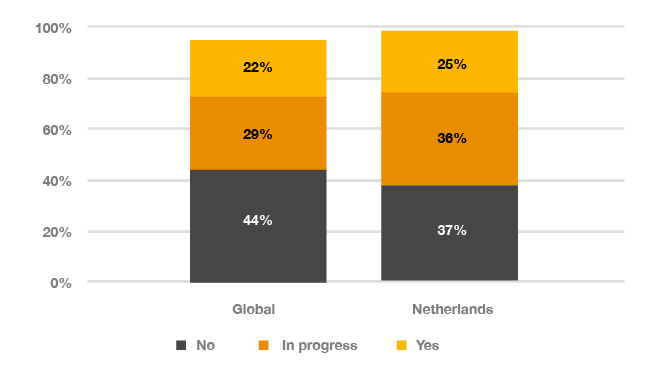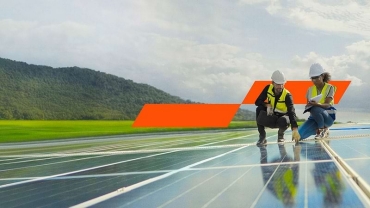
CEOs worldwide are struggling to reduce greenhouse gases. According to PwC's 25th CEO Survey, this also applies to corporate executives in the Netherlands. A quarter of the Dutch respondents aim for net zero. Over a third say they are preparing for this and another third are not working on a net zero target.
The results of PwC's CEO Survey include responses from 4,446 CEOs worldwide, including 84 Dutch CEOs. Respondents are very optimistic about the economic outlook for the next twelve months.
A quarter of CEOs aim for net zero
25 percent of Dutch CEOs indicated in the survey that they are aiming for net zero and 36 percent are in the process of doing so. A net zero goal means that organisations are striving to reduce all their emissions, both those caused directly by their own company and in their supply chain.
Of both of these groups of respondents, nearly half indicated that they have aligned or want to align this net zero target to science-based targets. This means that an organisation has aligned its emission reduction targets with the Paris climate agreement. The global action required to meet that target is thus translated to the company level.

Reduction targets in Strategy
To meet the Paris goals, global CO2 emissions must be cut in half by 2030 and reach net zero by 2050. These goals will only be within reach if virtually every sector transforms. Incidentally, it is not that companies without a net zero target are not doing anything: another result of the CEO Survey shows that 56 percent of Dutch CEOs have included CO2 reduction targets in their business strategy. Compared to the total number of global respondents, that percentage is high.
‘Companies are looking for knowledge about measuring impact’
Yet the percentage of Dutch outcomes that do not aim for net-zero and have not included greenhouse gas reduction in their business strategy is still quite large. The CEO of PwC Netherlands, Ad van Gils, calls this striking.
'It is striking because everyone is talking about climate. Before the Christmas break we had the COP26 summit in Glasgow. However, you see that the concrete translation of the ambition to solve the problem at companies is limited. This is not so much unwillingness. Companies are looking for knowledge about measuring impact and about making plans that contribute to the energy transition. They are looking for help to translate their potential contribution into a concrete ambition. There is still a lot of work to be done there.'


‘Focus on the long term increases’
'There is a lot of focus from CEOs on short-term challenges such as cyber security. That is understandable, but it is precisely now that we all must take steps to be able to operate sustainably in 2030’, says chairman Ad van Gils of the board of PwC in the Netherlands.'
‘Plenty of reason for optimism’
PwC’s chief economist Jan Willem Velthuijsen understands the optimism of CEOs. ‘Economically, things are going well. Most organisations have strong balance sheets. That's why it's now time to invest heavily in social themes like climate change and diversity. That's how you create sustainable trust.’

Dutch CEOs' expectations of global and Dutch economic growth over the next 12 months
Despite uncertainties, optimism among CEOs is high
Dutch CEOs, like last year, are optimistic about the global economic outlook. Eighty percent expect the Dutch economy to grow next year. Expectations about their own company are also rosy.
Incidentally, the respondents completed the survey before the omicron variant of the virus emerged. That may have influenced the results, but nevertheless PwC's chief economist Jan Willem Velthuijsen thinks the CEOs' optimism is justified.
'There are many uncertainties: economic growth could slow down due to high inflation, the very tight labor market and a possible new outbreak of the virus, but I don't expect a real new economic dip because of this. Despite the ongoing COVID-19 pandemic, the economy has continued to run. Companies have customers, there is money in abundance for consumers to spend and companies to invest. I can understand that optimism from CEOs.'
CEO's are also very confident in the prospects for their own company
CEOs are also very optimistic about the prospects for their own companies. 88 percent are very to moderately optimistic that revenues will grow over the next twelve months. The list of optimistic CEOs worldwide is headed by executives in private equity and the technology sector. The CEOs who are more cautious in this regard come mainly from the hospitality and leisure industry and the automotive sector. These sectors are dealing with the effects of the COVID-19 pandemic and supply chain disruptions, respectively.
Jan Willem Velthuijsen: ‘The optimism concerns revenues. CEOs do have to take into account a higher cost base. Energy prices are very high, wages are likely to rise due to labor shortages, many sectors still have supply chain issues. That could come at the expense of profitability.'

Dutch CEOs' expectations of their companies’ revenue growth

Concern over global threats (only ‘extremely’/‘very’ concerned)
The economy is doing well, but CEOs have full agendas
Chief economist Jan Willem Velthuijsen does not believe that CEOs can sit back and relax. ‘The economy is doing well, but at the same time you can see that CEOs have many concerns. They have an overfull agenda, especially because of developments outside their own company. Think of the supply chain problems that many companies have as a result of COVID-19. The large amount of regulation, the immediate threat of cyber attacks and the great pressure to make a substantial contribution to combating climate change.'
Velthuijsen draws a parallel with the newly formed cabinet: 'The new government has chosen to make huge investments to tackle problems that have been simmering for years. I think the business community should do the same. The situation is good, money is still cheap. It's time to invest heavily in solutions.'
Contact us
























